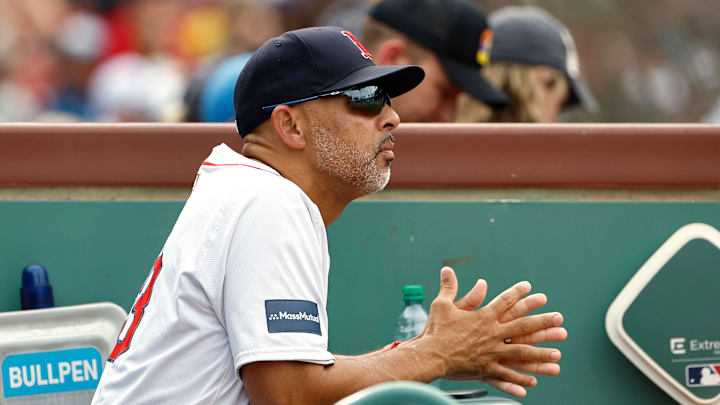On July 24, as Boston Red Sox fans everywhere hoped for positive trade deadline news, the team announced a three-year contract extension for manager Alex Cora.
The news came as a shock to many baseball fans. Reporters and insiders theorized that Cora would test managerial free agency, as Craig Counsell did the season before. The Chicago Cubs' new skipper fetched the largest managerial deal in history after his free agent stint and Cora was expected to collect nearly as much money after his potential foray into the open market.
Now, the Red Sox will go into the offseason without the panic of a managerial search on their plate. But the relief of the deal was swiftly mitigated by Boston's seemingly inevitable August and September downturn.
Cora managed the Red Sox to 11 games above .500 by the All-Star break. It seemed every single Sox player was producing on offense, and the frequency of errors by the infield slowed. Cora had been praised by many of his players and members of Red Sox staff for his relationship with the team and the culture he created in the clubhouse.
In the first half, Cora's management reflected trust in his players and respect for their feelings for the game. He let his starters pitch themselves out of sticky situations and managed the lineup well.
Since the second half began, the skipper has made some strange choices. He pulled Cooper Criswell from a perfect game against the Tigers, who are now ahead of the Sox in the wild card standings. Rich Hill allowed a homer three batters into his outing, and the Sox lost, 4-1.
Alex Cora's recent managerial struggles raise questions about Red Sox contact extension
How much blame should Alex Cora get for another second-half Red Sox swoon? https://t.co/LKTQGo4Son #RedSox pic.twitter.com/GKlCUfBQeT
— WEEI (@WEEI) September 4, 2024
Masataka Yoshida is batting .311/.371/.481 over his last 30 games, but Cora has benched him in favor of other players in the outfield. Boston is desperate for offensive production — it posted three runs against the Mets on Sept. 4, its most runs in a game since Aug. 30 — and sitting Yoshida during a crucial stretch has proven detrimental for the lineup. He, like the rest of the Red Sox's lineup, has slumped in recent games, and he's batting just .217/.250/.217 in his last seven appearances.
Boston's third-straight late-season collapse is a tired phenomenon. The Red Sox's rough play on all sides of the ball and Cora's inexplicable managerial choices have brought them back down to a perpetually-.500 team, on the brink of elimination.
It's been years since Cora's been given an elite, or even average, roster to work with, which has definitely played a part in Boston's recent late-season woes. But Cora's repeated inability to keep his team together late in seasons raises questions about the future.
Cora prioritized his family's needs when re-signing with the Red Sox — the skipper and his family love the Boston area — but one has to wonder about the promises the front office may or may not have made before the deal was done. Cora has been regarded as one of MLB's best skippers in recent years, and he could've fetched the giant contract experts expected had he become a free agent.
Hopefully, he signed in Boston under the condition that the front office spends some money and gives the roster effort this winter. A roster suitable for one of the most valuable teams in the league could help prevent a fourth-straight August collapse under Cora's leadership, and fans will finally get a sense of Cora's late-season capabilities.
